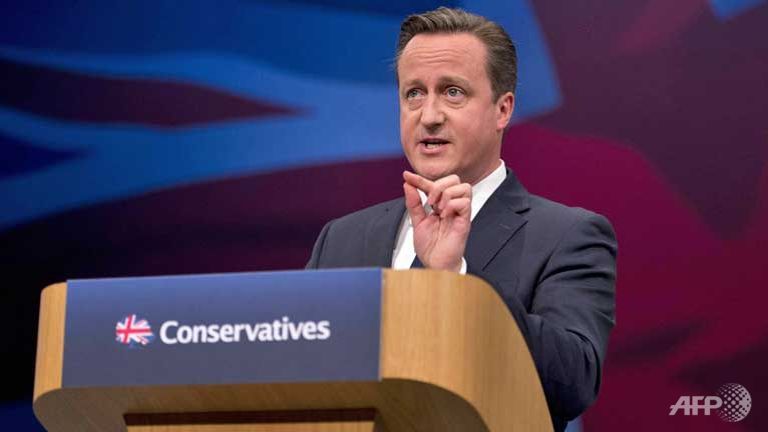UK's Cameron opens Conservative succession race
 |
| British Prime Minister David Cameron delivers a speech to delegates on the final day of the annual Conservative Party Conference in Manchester, north west England. (AFP PHOTO/OLI SCARFF) |
MANCHESTER: British Prime Minister David Cameron on Wednesday (Oct 7) fired the starting pistol in the race to replace him as leader of the Conservatives, outlining his programme in the time he has left.
"I can say something today that perhaps no prime minister has ever really been able to say before," he told delegates at the party's annual conference in Manchester. "I'm starting the second-half of my time in this job. I am not going to fight another election as your leader. So I don't have the luxury of unlimited time."
Cameron vowed to tackle discrimination, extremism and "big social problems", rework Britain's relationship with the EU and promised an "all-out assault on poverty".
Cameron also used his keynote speech to attack new Labour leader Jeremy Corbyn as a "terrorist sympathiser" and vowed to fight for EU reform ahead of Britain's in-out referendum, adding he had "no romantic attachment to the European Union".
Long-standing divisions between europhiles and eurosceptics within his party have come to the fore ahead of an EU membership referendum planned by 2017. But much of the focus on the sidelines of this week's conference was on who had auditioned best to replace Cameron.
Wednesday was the first time Cameron declared his intentions to the party, although he told the BBC in an interview before May's general election that he would not seek a third term.
At the front of the queue is finance minister George Osborne, a close ally of Cameron. He is often seen as the power behind the throne and the architect of Britain's austerity drive that is widely credited with winning the election.
During his keynote speech on Monday, Osborne audaciously claimed that the party was "the only true party of labour" and lifted the quote "we are the builders" directly from Labour hero Aneurin Bevan, one of the architects of Britain's post-war free National Health Service.
Guardian columnist Jonathan Freedland said the speech "laid bare" his leadership ambitions. "The desire to be seen as a leader-in-waiting could not have been clearer," he wrote.
"He sees a chance for his party to enjoy full-spectrum dominance, to command the centre ground and even parts of the centre-left - terrain he reckons has now been vacated by Labour."
If Osborne is banking on his fiscal record to woo the party, then his likely main rival Boris Johnson looks set to use his affable personality, if his speech on Tuesday is any indicator.
His joke-packed address brought delegates to their feet, but beyond the buffoonery Johnson swiped at Osborne for copying his policies and warned the finance minister over his plans to cut tax credits for low earners.
'Iron Chancellor'
Meanwhile, interior minister Theresa May made her assumed leadership pitch on a platform of tightening immigration that drew criticism from even the right-wing press.
"It's hard to know where to start with Theresa May's awful, ugly, misleading, cynical and irresponsible speech to the Conservative Party conference," wrote Telegraph columnist James Kirkup.
"If you haven't seen reports of it, allow me to summarise: 'Immigrants are stealing your job, making you poorer and ruining your country. Never mind the facts, just feel angry at foreigners. And make me Conservative leader.'"
Ruth Davidson, leader of the Scottish Conservatives, emerged from the conference as a potential dark horse after delivering a barnstorming speech.
Cameron himself gave few clues as to his preferred candidate, but did call Osborne the "Iron Chancellor" while also heaping praise on Johnson's record as London mayor.
Instead, the Tory leader aimed his guns on Labour's new leftist leader Corbyn.
"Thousands of words have been written about the new Labour leader. But you only really need to know one thing: he thinks the death of Osama bin Laden was a 'tragedy'," he told the audience, who responded with a standing ovation.
"We cannot let that man inflict his security-threatening, terrorist-sympathising, Britain-hating ideology on this country we love."
What the stars mean:
★ Poor ★ ★ Promising ★★★ Good ★★★★ Very good ★★★★★ Exceptional
Latest News
More News
- Russian President congratulates Vietnamese Party leader during phone talks (January 25, 2026 | 09:58)
- Worldwide congratulations underscore confidence in Vietnam’s 14th Party Congress (January 23, 2026 | 09:02)
- Political parties, organisations, int’l friends send congratulations to 14th National Party Congress (January 22, 2026 | 09:33)
- 14th National Party Congress: Japanese media highlight Vietnam’s growth targets (January 21, 2026 | 09:46)
- 14th National Party Congress: Driving force for Vietnam to continue renewal, innovation, breakthroughs (January 21, 2026 | 09:42)
- Vietnam remains spiritual support for progressive forces: Colombian party leader (January 21, 2026 | 08:00)
- Int'l media provides large coverage of 14th National Party Congress's first working day (January 20, 2026 | 09:09)
- Vietnamese firms win top honours at ASEAN Digital Awards (January 16, 2026 | 16:45)
- ASEAN Digital Ministers' Meeting opens in Hanoi (January 15, 2026 | 15:33)
- ASEAN economies move up the global chip value chain (December 09, 2025 | 13:32)
















 Mobile Version
Mobile Version